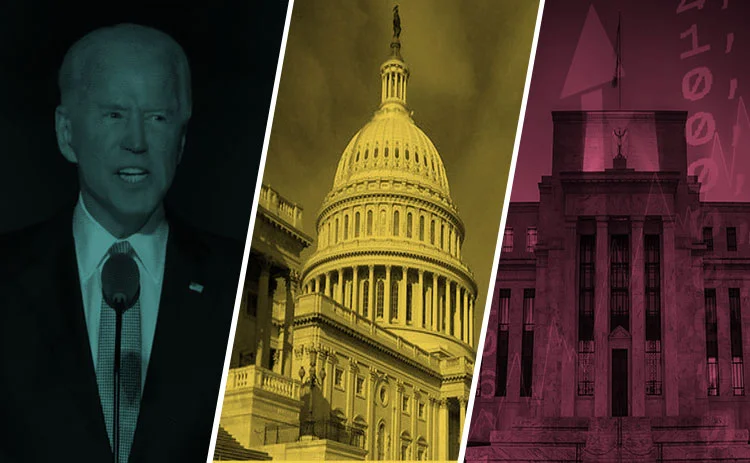
Climate risk, fixing Libor and tough times for US G-Sibs
The week on Risk.net, November 7-13, 2020

Joe Biden’s slow road to remaking US financial regulation
Moves on climate risk could come early; other changes may have to wait until the end of 2021, or later
Congress readies surprise ‘tough legacy’ Libor fix
Federal legislation to ensure legacy Libor contracts can move to SOFR is in the works
G-Sibs see little sign of relief on Fed’s systemic buffer
Central bank liquidity and Treasuries will push US firms into higher G-Sib buckets
COMMENTARY: The levers of power
Change is coming in climate policy in both the UK and the US – and in both cases it’s coming from an unexpected direction. The Bank of England has warned the banks it supervises to include three carbon-pricing scenarios in their regulatory stress tests – including not only the economic effects of carbon pricing, but the costs associated with the physical risks of climate change (already modelled by some institutions in their own internal tests).
And newly-elected US president Joe Biden has promised to make climate change a policy priority. With resistance from Republicans in Congress almost inevitable, financial regulation may be a way of sidestepping the roadblock they represent, and pushing through policy change with the assistance of supportive state governments. (The same indirect approach led a previous administration, blocked by Congress from action on climate change, to act by using the Environmental Protection Agency to declare carbon dioxide a pollutant.)
Earlier this year, veteran quant Robert Litterman told Risk.net that excluding the costs of climate change from financial risk management was “the fundamental market failure” and called on US regulators to integrate climate risk as quickly as possible.
In reality, US action on climate change will probably take second place to action on the Covid-19 outbreak now hitting the country – and Europe as well – in a second wave after the apparent let-up of the summer months.
But the idea that pollution control and disaster prevention will be happening through changes in financial industry regulation isn’t as strange as it sounds. Though, as of January next year, the US presidency will no longer be occupied by someone who asserts that climate change is a Chinese hoax, many of his persuasion will still hold seats in the Senate, in a position to block appointments and legislation. Executive orders and regulatory decisions may prove the only viable routes for action – though, as the Trump administration showed, they can be overturned by a hostile successor as quickly as they are made.
But action at the UK and US level won’t be enough. The financial sector has been calling for global climate risk standards – which hold out hope not only of pushing global emissions lower still, but also of giving the sector more certainty about the financial and regulatory risks involved in adapting to a net-zero way of doing business.
STAT OF THE WEEK
Notional amounts of cleared credit default swaps surged 25% to $5.29 trillion over the first half of 2020 – the biggest jump in a decade, data from the Bank for International Settlements shows. Cleared contracts as a share of total outstanding amounts hit 60%, up from 56% in the second half of 2019. It’s the fastest clearing rates have risen since H1 2017. Cleared CDS volumes surged in H1 – BIS
QUOTE OF THE WEEK
“Risk management lets computers and formulas and data overrule what the top people want to do. And there are many institutions that will not tolerate that” – Aaron Brown, ex-AQR
Further reading
Only users who have a paid subscription or are part of a corporate subscription are able to print or copy content.
To access these options, along with all other subscription benefits, please contact info@risk.net or view our subscription options here: http://subscriptions.risk.net/subscribe
You are currently unable to print this content. Please contact info@risk.net to find out more.
You are currently unable to copy this content. Please contact info@risk.net to find out more.
Copyright Infopro Digital Limited. All rights reserved.
You may share this content using our article tools. Printing this content is for the sole use of the Authorised User (named subscriber), as outlined in our terms and conditions - https://www.infopro-insight.com/terms-conditions/insight-subscriptions/
If you would like to purchase additional rights please email info@risk.net
Copyright Infopro Digital Limited. All rights reserved.
You may share this content using our article tools. Copying this content is for the sole use of the Authorised User (named subscriber), as outlined in our terms and conditions - https://www.infopro-insight.com/terms-conditions/insight-subscriptions/
If you would like to purchase additional rights please email info@risk.net
More on 7 days in 60 seconds
Bank capital, margining and the return of FX
The week on Risk.net, December 12–18
Hedge fund losses, CLS and a capital floor
The week on Risk.net, December 5–11
Capital buffers, contingent hedges and USD Libor
The week on Risk.net, November 28–December 4
SA-CCR, SOFR lending and model approval
The week on Risk.net, November 21-27, 2020
Fallbacks, Libor and the cultural risks of lockdown
The week on Risk.net, November 14-20, 2020
FVA pain, ethical hedging and a degraded copy of Trace
The week on Risk.net, October 31–November 6, 2020
Basis traders, prime brokers and election risk
The week on Risk.net, October 24-30, 2020
Covid bank tests, swap fix deferred and SOFR switch
The week on Risk.net, October 17-23, 2020







